Books
Books
in random order
.jpg)
Under the Wings of the Valkyrie
An exploration of eroticism in extremism.
Published in Icelandic in 1994, Under the Wings of the Valkyrie is the work that established Sjón's literary career. Short and intense, the story unfolds through a letter from Icelandic architect Fridjón B. Fridriksson to his wife, revealing his lifelong obsession with German militant Gudrun Ensslin, of the Baader-Meinhof gang. He first glimpsed her on TV as a child and now Ensslin lingers in his dreams and has become the defining fixture of his psyche. To break free from Ensslin, and salvage his marriage, Fridjón resorts to drastic measures. Disturbing yet captivating, Under the Wings of the Valkyrie blurs the lines between passion and madness, fantasy and reality.
Sjón (Sigurjón Birgir Sigurðsson, born 1962 in Reykjavik) is a celebrated novelist, poet, and lyricist, who has become a central figure in Icelandic culture. Junot Diaz hailed him as "the trickster who makes the world" and the late, great A.S. Byatt regarded him as "a Magus of the North." He is known also for his collaborations with singer Björk, receiving an Oscar nomination for lyrics to Lars von Trier's Dancer in the Dark, and his screenplays for critically acclaimed films The Northman and Lamb. His works have been translated into 30 languages.
Translated from the Icelandic by Brian Fitzgibbon.
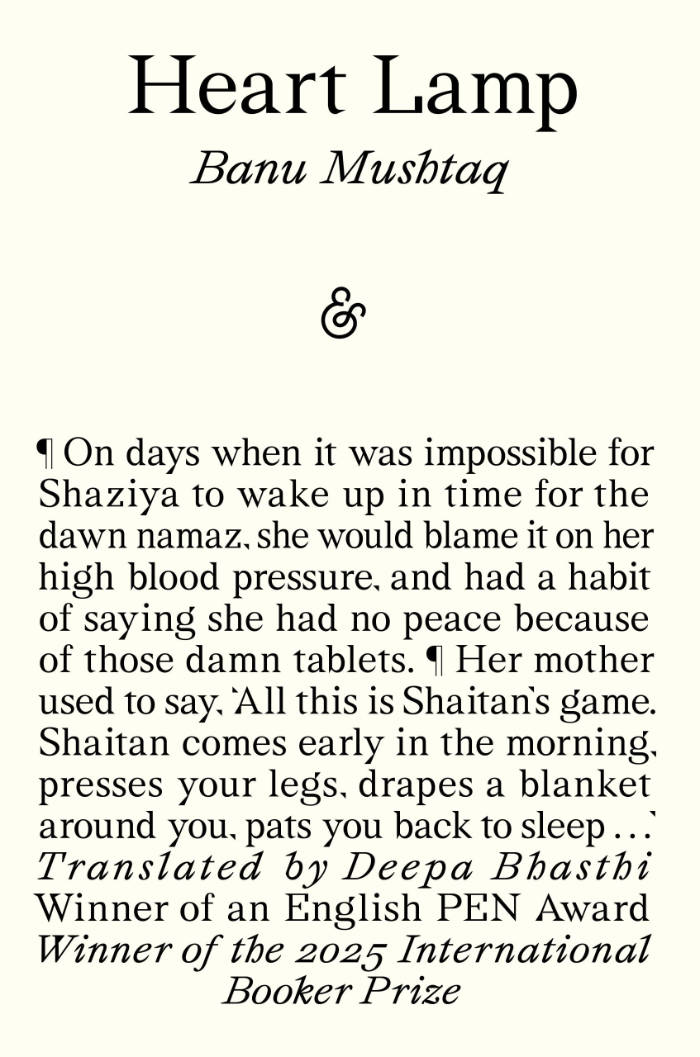
Heart Lamp
In the twelve stories of Heart Lamp, Banu Mushtaq exquisitely captures the everyday lives of women and girls in Muslim communities in southern India. Published originally in the Kannada language between 1990 and 2023, praised for their dry and gentle humour, these portraits of family and community tensions testify to Mushtaq’s years as a journalist and lawyer, in which she tirelessly championed women’s rights and protested all forms of caste and religious oppression. Written in a style at once witty, vivid, colloquial, moving and excoriating, it’s in her characters – the sparky children, the audacious grandmothers, the buffoonish maulvis and thug brothers, the oft-hapless husbands, and the mothers above all, surviving their feelings at great cost – that Mushtaq emerges as an astonishing writer and observer of human nature, building disconcerting emotional heights out of a rich spoken style. Her opus has garnered both censure from conservative quarters as well India’s most prestigious literary awards; this is a collection sure to be read for years to come.
Winner of the 2025 International Booker Prize.

The Cow
This text is filthy and fertilized, filling and emptying, filling and emptying, atrocious and politic with meaning. The Cow is a mother, a lover, and a murdered lump of meat, rendered in the strongest of languages. I cannot count the altering that happens in the very large rooms that are the guts of her.
To call Ariana Reines’ poetry scatological doesn’t even scratch the surface. “I COULD BE A DIAPER FOR THE DAY’S RESIDUALS,” she writes, and, “She clasped the event to her and proceeded. Fucked her steaming/ eyehole and ended it.” The Cow is a body in the way that texts are bodied—”Are you so intelligent your body doesn’t have you in it.”—but not in the way that allows the text to become desensitized, depersonalized, sterilized.
Winner of the 2006 Alberta Prize

Desiderata
Desiderata is a collection of Lizzy Mercier Descloux's poetry, photos, and diaristic fragments from her visit to New York City in the winter of 1977. Only eighteen at the time, Descloux fell into the orbits of the nascent No Wave scene festering in Lower Manhattan, where she befriended Richard Hell, Patti Smith, and ZE Records founder Michel Esteban. Desideratacharts the musician's early ambitions as a writer, revealing a potent poetic voice that careens from acid-tinged social observations to outright Dadaist semantic revelry, interspersed with collages and hand-written notes. Originally composed entirely in French, this is the first time these works have ever appeared in English and this edition includes the original French facsimile bound tête-bêche with the new English translation.
Martine-Elisabeth "Lizzy" Mercier Descloux (16 December 1956 – 20 April 2004) was a French musician, singer-songwriter, composer, actress, writer and painter. She collaborated with a wide range of musicians including Wally Badarou and Chet Baker.
Emma Ramadan was initiated into the mystery of Bastet at the age of thirteen and rose to the station of High Scioness. After leaving the temple she hopped freight across the Maghreb, where she began translating esoterica carved into the boxcar walls. She has independently discovered numerous uncatalogued cave systems and varietals of nightshade tea. Her name appears on the underside of stones and in various magazines whose pages seem to turn on their own.
Translated by Emma Ramadan.
Bilingual edition: FR/ENG
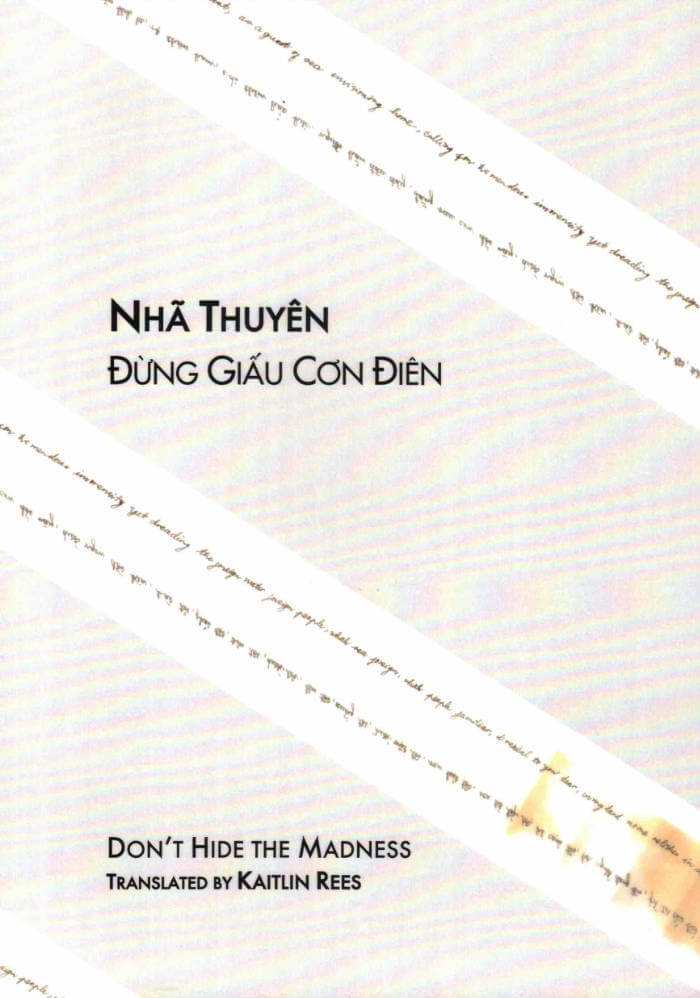
đừng giấu cơn điên / don’t hide the madness
Nhã Thuyên’s đừng giấu cơn điên / don’t hide the madness contains eight poems excerpted from the forthcoming book vị nước (taste of water). To read this work is to be wrenched out of oneself and into the opening and closing world of language: a world in equal parts vegetal, liquid, human, stone, at once bordered river and open sea, enclosed maze and open field; a labyrinth, but a labyrinth of the utmost clarity; a rising or collapsing building made of words that’s not a ‘dwelling’ so much as a refusal to dwell, which is its loneliness and bereftness and consolation and strength, all at once. “Steps here pulled forth by some line of poetry out of time”, such work “fabricate[s] a bed out of sea, build[s] a house out of tremendous immensity”. It’s the result of a lifelong investigation of the Vietnamese language, deep, joyous, scrupulous and sometimes painful; of a lifelong investigation of the whole deep field of history and time as it’s lived deep within the person and in the field beyond the personal that poetic language affords us. This is a realm, not of simple freedom, but of the struggle for the fullest record and the fullest measure towards which a poet can strive. Don’t hide the madness. Don’t be at peace. [D.G.]
NHÃ THUYÊN secludedly anchors herself to Hà Nội, Việt Nam and totters between languages. She has authored several books in Vietnamese and/or in English translations, including viết (writing) (2008), rìa vực (edge of the abyss) (2011), từ thở, những người lạ (words breathe, creatures of elsewhere) (2015), and bất\ \tuẫn: những hiện diện [tự-] vắng trong thơ Việt (un\ \martyred: [self-] vanishing presences in Vietnamese poetry) (2019). Her next book of poetry vị nước (taste of water) is waiting to see the moon. She has been unearthing her notebooks and rubbing her words in Berlin as a 2023 DAAD Artists-in-Berlin fellow, and learning to quietly speak up with care.
KAITLIN REES is a translator, editor, and public school teacher based in New York City. She translates from the Vietnamese of Nhã Thuyên, with whom she co-founded AJAR, the small bilingual journal-press that organizes an occasional poetry festival. Her translations include moon fevers (Tilted Axis, 2019), words breathe, creatures of elsewhere (Vagabond Press, 2016), and the forthcoming book of poetry taste of water.

Reality (Dark) Fragments (Light)
This monograph covers more than fifty years of creation by Art & Language, whose artists are at the origin of conceptual art. Through unpublished texts by Matthew Jesse Jackson and Art & Language, a transcript of their opera libretto Victorine, and an interview with the artist collective, this publication questions their journey, and more broadly, the relationship between contemporary art and conceptual art.
The permanent collection of the Château de Montsoreau – Museum of Contemporary Art has grown to include 800 works from Art & Language. To celebrate this event, the museum produced a major exhibition and a publication titled Reality (Dark) Fragments (Light). The monograph and exhibition look back at 50 years of creation by these critical, provocative, subversive, punk art collective. They question the main issues involved in Art & Language's work: conversation as an artwork, description, transdiciplinarity, crisis in the relationship between the artist, the museum and the art gallery.
Edited by Marie-Caroline Chaudruc.
Foreword by Marie-Caroline Chaudruc.
Text by Matthew Jesse Jackson, interview with Art & Language by Victorine Meurent.

Glossolalia
Translated by Kristine Ong Muslim with an introduction by Amado Anthony G. Mendoza III.
Feverish from the engrossing revelatory arcs of the uncanny, Glossolalia is a mind-bending foray into the twisted underlying logic of material reality and a rip-roaring romp through Philippine urban legends, psychogeography, and the uncomfortable, often seedy aspects of music, cinema, and art. Marlon Hacla—who is a computer programmer as well as a poet and created the first robot poet in Filipino, Estela Vadal—is a significant innovator in the Philippine poetic tradition. As Amado Anthony G. Mendoza III notes in his introduction, Hacla “eschews the spare language, subtle imagery, and quietism featured in most contemporary Philippine poetry. Hacla’s poems, especially here in Glossolalia (and in its informal sequel Melismas), read like an unapologetic statement against the New Critical tradition that has been pushing its weight in the Philippine literary scene for more than half a century.” This collection of relentless, densely layered prose poems is the third of Hacla’s books to be translated into English by Kristine Ong Muslim.
Marlon Hacla is a poet and artist living in Quezon City, Philippines. His first poetry collection, May Mga Dumadaang Anghel sa Parang (Manila: National Commission for Culture and the Arts, 2010), was published as part of UBOD New Authors Series II. His second book, Glossolalia, was published by High Chair in 2013. Kristine Ong Muslim’s English translations of his books are Melismas (Oomph Press, 2020), There Are Angels Walking the Fields (Broken Sleep Books, 2021), and Glossolalia (Ugly Duckling Presse, 2023).

I am Welton Santos.
I am Welton Santos reenacts a dialogue between the Brazilian geo-bio-architect Welton Santos and an Interviewer. The book, which is always read collectively, is used in reading performances by groups of at least 3 people.
Printed on the occasion of an artist residency at PAV, Parco d’Arte Vivente, Turin, July 2016. Texts based on transcripts of interviews with Welton Santos.

Les Matières de la nuit
« Et ensuite quand le calme est revenu, plantez à la place une femme noire qui lève le poing, même un instant, comme pour faire semblant. Une femme noire fera le job, avec le poing levé, c’est mieux, c’est cool. » Écho ou fantôme de Suites décoloniales, ce recueil de poésie prolonge et complète les chemins parcourus par Olivier Marboeuf dans son essai, au moyen de ce que l’auteur appelle une « pratique théorique de la poésie ».
Fragments de mauvaises rencontres, haïkus sur le beat accéléré d’un train, hommages à la banlieue chérie, Olivier Marboeuf se fait conteur polyphonique, poreux au monde et dépositaire des histoires étendues et vues dans de multiples nuits.

The Hour of the Star
The devastating final work by Brazil’s greatest modern writer, The Hour of the Star tells the haunting tale of Macabéa—a typist who lives in the slums of Rio—underfed, sickly, and unloved, yet inwardly free.
Translated from the Portuguese by Benjamin Moser. With a contribution by Paulo Gurgel and Valente Colm Tóibín.
The Hour of the Star, Clarice Lispector's consummate final novel, may well be her masterpiece. Narrated by the cosmopolitan Rodrigo S.M., this brief, strange, and haunting tale is the story of Macabéa, one of life's unfortunates. Living in the slums of Rio de Janeiro and eking out a poor living as a typist, Macabéa loves movies, Coca-Cola, and her rat of a boyfriend; she would like to be like Marilyn Monroe, but she is ugly, underfed, sickly, and unloved. Rodrigo recoils from her wretchedness, and yet he cannot avoid realization that for all her outward misery, Macabéa is inwardly free. She doesn't seem to know how unhappy she should be. Lispector employs her pathetic heroine against her urbane, empty narrator—edge of despair to edge of despair—and, working them like a pair of scissors, she cuts away the reader's preconceived notions about poverty, identity, love, and the art of fiction. In her last novel she takes readers close to the true mystery of life, and leaves us deep in Lispector territory indeed.
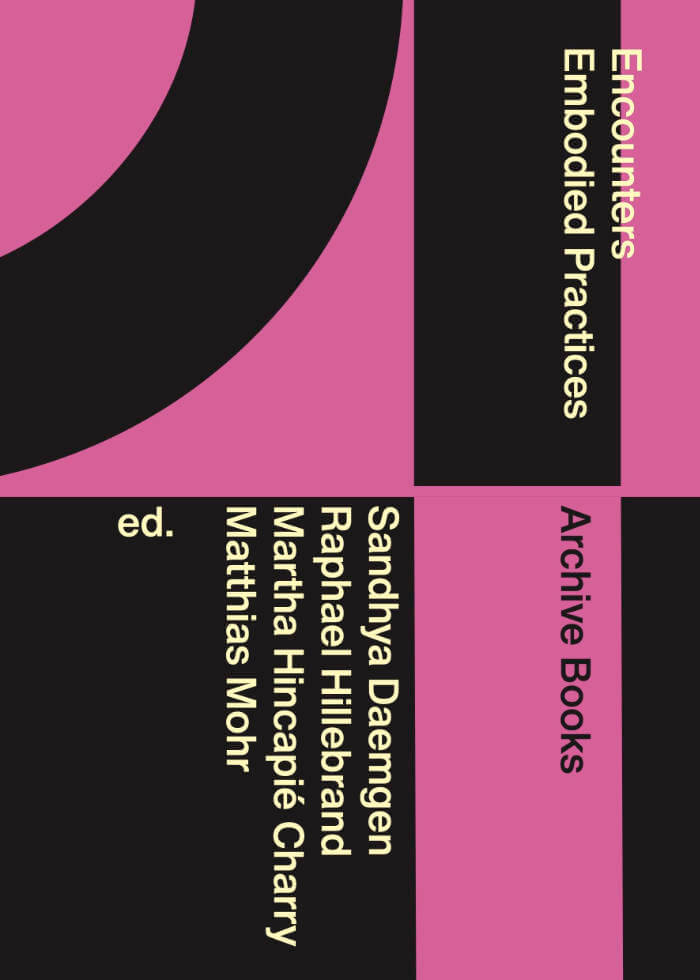
Encounters – Embodied Practices
Sandhya Daemgen, Raphael Hillebrandt and 2 more
Conversations about embodied strategies of knowledge production and knowledge transmission based on the choreographic and curatorial practices of about fifteen international choreographers, performers, dramaturges and curators.
In the context of the numerous ethical-political challenges of the global present, actors from the dance and choreography scene both in Berlin and internationally talk about forms of knowledge production beyond the prevailing conception found in Western modernity. They counter the mind-body separation and the notion of a universality of knowledge with multiplicities of knowledge production that emerge with and from the reality of differently situated bodies.
What potential do embodied practices offer for emancipatory movements? How can community be created through these practices, and what responsibilities does this entail? What role does the body play in the preservation and transmission of knowledge?
In this publication, edited by the choreographers and curators Martha Hincapié Charry, Sandhya Daemgen, Raphael Moussa Hillebrand and Matthias Mohr; Lukas Avendaño, Wagner Carvalho, Sandhya Daemgen, Ismail Fayed, Alex Hennig, Raphael Moussa Hillebrand, Martha Hincapié Charry, Isabel Lewis, Matthias Mohr, Prince Ofori, Mother "Leo" Saint Laurent, Léna Szirmay-Kalos, Thiago Granato and July Weber conduct conversations about embodied strategies of knowledge production and knowledge transmission based on their respective choreographic and curatorial practices.

Merchant
A post-apocalyptic retelling of William Shakespeare's The Merchant of Venice.
Who will survive when the world is destroyed? Can stories from the distant past teach us how to change a dismal present? Merchant shifts perspective between three survivors of a flooded world as they try to navigate the threat of mass starvation; Jessica, a patrilineal Jew from Venice (named after the Italian city but located on the mountain K2) who has memorized the complete works of Shakespeare; Cem, an orphan of Venice; and Shinobu, an advisor to the empress Ama in Fuji. Ama has been gifting edible algae blocks to nations worldwide, but Jessica's arrival in Fuji to beg for more food for Venice upsets the delicate international balance Shinobu has been maintaining. As a series of buried secrets and miscommunications carry consequences of potential global destruction, everyone must determine what they are willing to do to survive in a hopeless world.
Alexandra Grunberg attended New York University's Tisch School of the Arts earning a BFA in Theatre. She earned her MLitt and DFA in Creative Writing at The University of Glasgow. Grunberg presented her research at various academic conferences in the UK, including “Once and Future Fantasies” at the University of Glasgow, “CRSF 2021 10th Anniversary Conference—Speculative Futures & Survival” by the University of Liverpool, “Beast Modernisms Conference 2019” at The University of Glasgow, “Creative Writing: Processes, Theory, and Influences” at The University of Edinburgh, and “The Literary Self: From Antiquity to the Digital Age” at The University of Edinburgh.

Economy as Intimacy (vol.1)
A series of choreopoems by Eric Peter. Published at the occasion of 'Assemblages of Intimacy' a group exhibition in a Tale of a Tub, Rotterdam in 2018.

Vulnerability: or, Why I Show My Tits & Cock & Balls In My Performances
Vulnerability: or Why I show my T*ts & c*ck & b*ll’s in my Performances is a new essay by Yvonne LeBien. This essay speaks to the agency of the trans body in public through LeBien’s years of performing naked in the world as a trans woman. In this time of nightmarish evangelical transphobia, Yvonne’s unapologetic rawness is urgent.
This 60-page, 5x4.5, 5x4.5-inch book is as small as it is crucial in the discourse of trans excellence in a climate of fear by the ignorant.

Christ’s Cunt
Christ’s Cunt is a book of poems that has nothing to do with the Christian God. It has everything to do with the pure insanity of the Christ figure, the hedonism of Christ, and the bloody images and symbols of “His” birth. Washing the feet of the Whore; turning the other cheek; starvation, body mutilation, transformation, wine, miracles, orifices, bleeding. It’s pure rave. This is the first era in history in which we can do medical procedures to change a person’s gender. How monumental that is in human civilization, how monstrous, how absurd this would appear for people in the past. For me, to get a cunt is as monumental an act in the course of history as when Christ first let “him” self be nailed to a phallic plank. I love it.

The Flesh
The Flesh is a collection of Yves B. Golden's poems, lyric essays and social criticism – and often these generic distinctions become blurred. Published by Ediciones La Escocesa (Barcelona, ES), TABLOID facilitated this book's production as editors and book designers. A selection of Golden's texts are also translated by Leto Ybarra, rendering the author's work into Spanish for the first time.
“Respectfully! The Flesh feels like a conjuring and a force of nature—unyieldingly raw, full of delectable sensitivity that shapes a world Yves B. Golden deliveries with formidable honesty—where her word is the journey, the body and the bond. Yves writes: ‘not one bird is declined entry into heaven’. The Flesh is succulent in the mouth of the mother— Yves is a steward of time machines, celestial bliss and untethered healing. The Flesh unties the tongue, waters the mouth and the garden. Within Yves’ 5th book she offers us a timeline in recognizing that all birds and angels alike can touch the sky. We are always, already, held and drenched in glory and deserving of love and safety. The Flesh is Black like obsidian. May our love bloom like the flesh in every lifetime.”
- keioui keijaun thomas
“Yves B Golden has given us a protection spell against tyranny; a Blue Guide for the conscious and the daydream; raw free jazz that knows the standards as well. Golden’s linguistically liberated fantasies can transmute into a body of politically imperturbable ethoses in the same sentence. This book offers information for an evolutionary sensitivity, for the next level of sense-making and particularity of the human being. Though the poet urges us to de-realize the flesh, to split our own heads open, we must also accommodate the flesh’s intangibles that interlock, conjoin, negate, and negotiate: such ‘outward and inward facing conundrums’ go on and on. Welcome this ‘bearer of turbulent news.’”
- Losarc Raal

Spring Brakers
An account of Spring Brakers, a project launched during the so-called First Wave. Spring Brakers was an online platform hosting video performances by a different artist each week alongside podcasts on various topics focusing on other labels or musical persuasions.
For this publication, all of the musicians who participated in the project are profiled, resulting in a grounded and oddly inspiring collection of testimonies of how artistic practices are shaped by an era that is still ongoing.
Artists include locals such as Bear Bones, Lay Low, Quanta Qualia, Vica Pacheco, KRAMP, Orphan Fairytale, and more, as well as far-out friends like Ka Baird, MSHR, Jung An Tagen, Eric Frye, and so on.
Each profile has a handy QR to redirect to each artist's video, and each copy includes a code to download a compilation made especially for the publication.

Martin Wong: Footprints, Poems, and Leaves
Self-published in 1968, Footprints, Poems, and Leaves collects dozens of poems written by Martin Wong between 1966 and 1968. Hand-written in a signature calligraphic style that he was just beginning to develop, the poems ebb and flow visually across the page, much like the fluctuating characters, scenes, and moods that inhabit them. This was Wong’s first book of poetry and it contains a double cover showcasing intricate drawings of skeletal angels and other tableaux, as well as a folded, looseleaf broadsheet containing two poems and a drawing of a boney leaf.
The poems were written during a relatively free period for the artist, shortly after he dropped out of Berkeley and began exploring San Francisco at the height of the hippy movement. The poems range from surrealist and pastoral descriptions of the urban subculture that surrounded him to downtrodden, travel-weary biographical entries that are both lonely and tender. Footprints, Poems, and Leaves functions like a journal capturing Wong’s tumultuous life in this period, which included being arrested at a queer, drug-fueled house party (along with Rudolf Nureyev and Dame Margot Fonteyn) and a stay in a mental institution in late 1967 and early 1968. Around the time of the book’s publication, Wong enrolled in Humboldt State University to finish his degree, beginning a new chapter for the artist.
Despite the dark backdrops of many of the works, the writing displays a playfulness with form and language and a sense of humor that can be seen throughout Wong’s later work as well. Altogether, Footprints, Poems, and Leaves creates a rich tapestry of visual poetry that is both a product of its time and the budding artistic mind of a young Martin Wong.
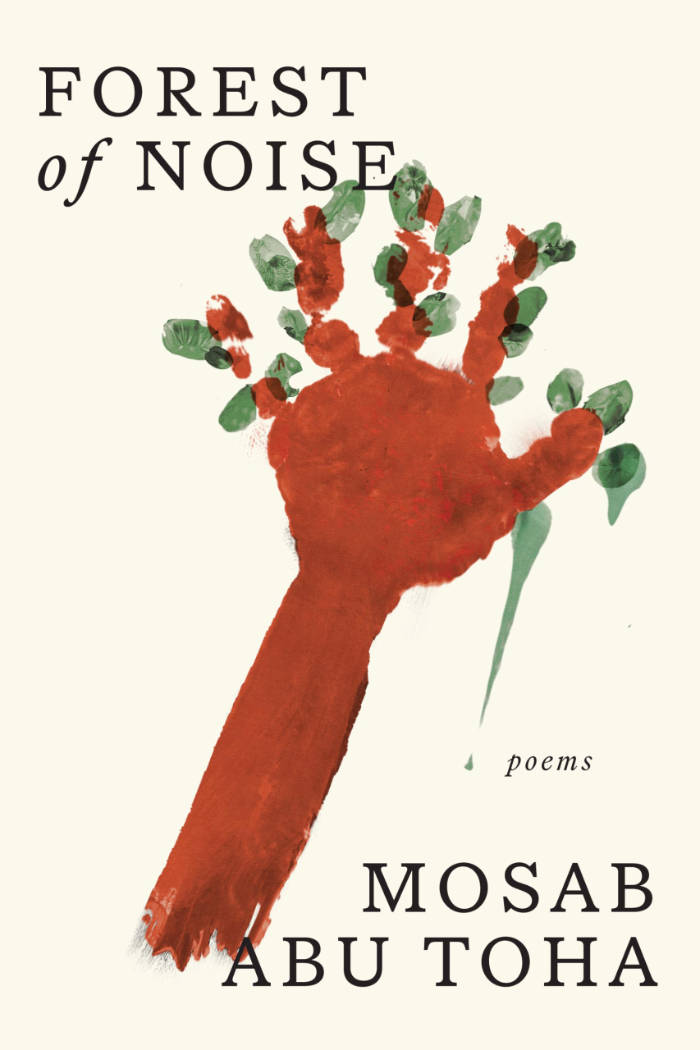
Forest of noise
Barely thirty years old, Mosab Abu Toha was already a well-known poet when the current siege of Gaza began. After the Israeli army bombed and destroyed his house, pulverizing a library he had painstakingly built for community use, he and his family fled for their safety. Not for the first time in their lives.
Somehow, amid the chaos, Abu Toha kept writing poems. These are those poems. Uncannily clear, direct, and beautifully tuned, they form one of the most astonishing works of art wrested from wartime. Here are directives for what to do in an air raid; here are lyrics about the poet’s wife, singing to his children to distract them. Huddled in the dark, Abu Toha remembers his grandfather’s oranges, his daughter’s joy in eating them.
Moving between glimpses of life in relative peacetime and absurdist poems about surviving in a barely livable occupation, Forest of Noise invites a wide audience into an experience that defies the imagination—even as it is watched live. Abu Toha’s poems introduce readers to his extended family, some of them no longer with us. This is an urgent, extraordinary, and arrestingly whimsical book. Searing and beautiful, it brings us indelible art in a time of terrible suffering.
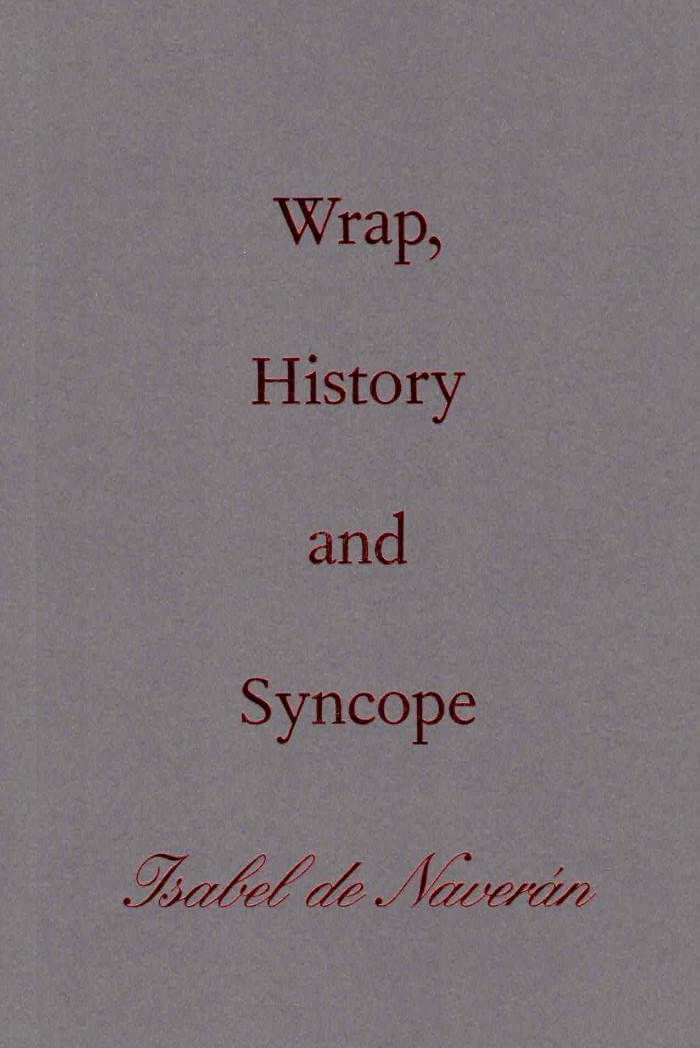
Wrap, History and Syncope
18 July 1936, Bayonne. After hearing the news of the Fascist uprising, the Spanish dancer and bailaora Antonia Mercé y Luque, known as La Argentina, suffers a syncope and dies in fateful synchrony with the Second Republic. History, and the artist’s body, have been seized and broken by the event.
In close dialogue with images and historical documents, Isabel de Naverán pursues the reverberations of that shock and how it resonates with collective pain and artistic translations (by Federico García Lorca, Gertrude Stein, Kazuo Ohno and others). How does history affect and move through bodies? How do living bodies carry and pass on cultural legacy and collective memory? What do these complex movements reveal about the present? Wrap, History and Syncope is an affective journey that invites the reader into tracing and revisiting other bodies, to ultimately dance their difference and multiplicity for oneself.
Isabel de Naverán is a writer and researcher. Concern with the passage and use of time is the backbone of her work, which focuses on bodily transmission and the examination of the concept of historical time by way of ephemeral and fugitive practices. She holds a PhD in art from the University of the Basque Country.
Translation from Spanish: Toni Crabb
Graphic design: Michaël Bussaer
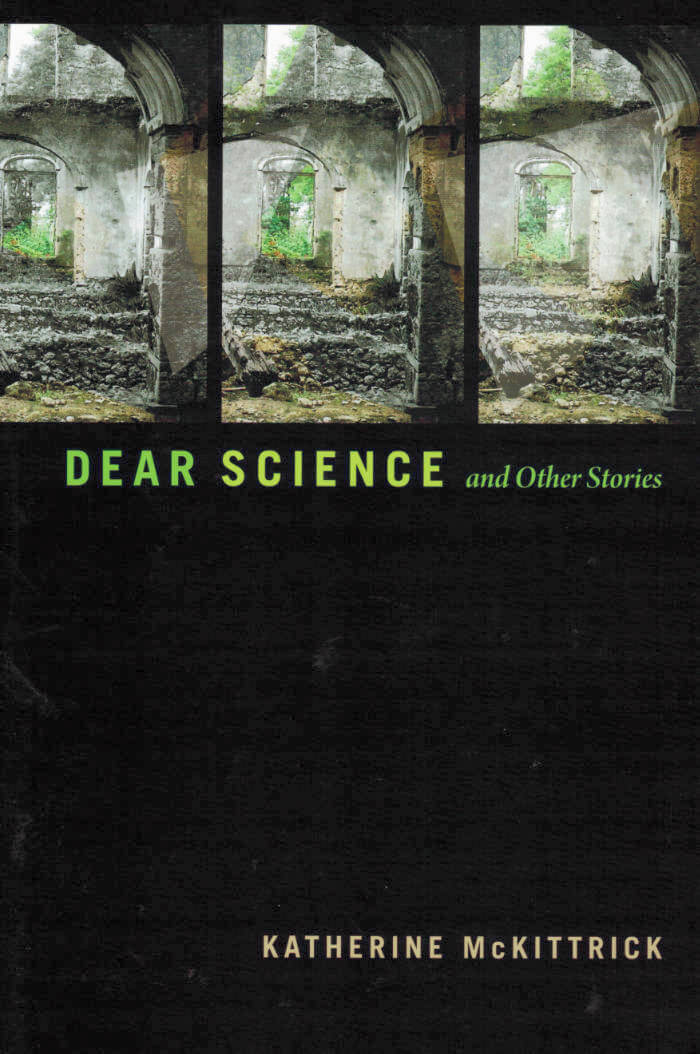
Dear Science and Other Stories
In Dear Science and Other Stories Katherine McKittrick presents a creative and rigorous study of black and anticolonial methodologies. Drawing on black studies, studies of race, cultural geography, and black feminism as well as a mix of methods, citational practices, and theoretical frameworks, she positions black storytelling and stories as strategies of invention and collaboration.
She analyzes a number of texts from intellectuals and artists ranging from Sylvia Wynter to the electronica band Drexciya to explore how narratives of imprecision and relationality interrupt knowledge systems that seek to observe, index, know, and discipline blackness. Throughout, McKittrick offers curiosity, wonder, citations, numbers, playlists, friendship, poetry, inquiry, song, grooves, and anticolonial chronologies as interdisciplinary codes that entwine with the academic form.
Suggesting that black life and black livingness are, in themselves, rebellious methodologies, McKittrick imagines without totally disclosing the ways in which black intellectuals invent ways of living outside prevailing knowledge systems.
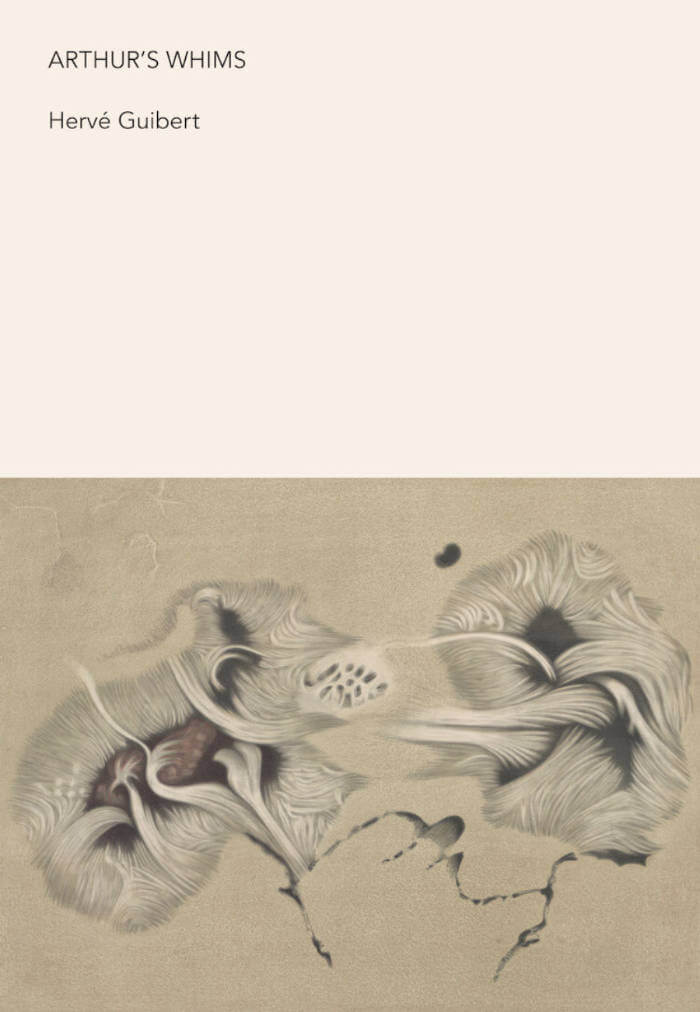
Arthur’s Whims
Arthur’s Whims is the tale of “a modern saint,” a love story born of a childhood dream of being “alone on a boat with a boy, a friend.” Arthur and his beloved Bichon—a young man who, after drinking Arthur’s tears, becomes pregnant with his child—drift through a stream of identities and circumstances: birdcatchers for a French taxidermist; sailors shipwrecked in an ice fortress; explorers of the Isles of Traitors, Babies, and Sadness; famous magicians in Oklahoma; religious and medical marvels. It is an anarchic, outrageous novel, in the tradition of Edgar Allan Poe and Comte de Lautréamont, now available in English for the first time in translation by Dana Lupo. This edition includes Hervé Guibert’s essay “The Bear,” in which he compares his books to rooms in a house, writing: “Arthur’s Whims would be the library of the house, and the bedroom of a child who will never be.” It is “a true adventure novel in the tradition of the genre, or what I believed to be its tradition, with great journeys, disasters, shipwrecks, cataclysms.”
“This short novel, offered here along with an essay by Guibert, reads like a madcap picaresque—one in which bodies can transform, the pace is constantly accelerating, and geography proves to be malleable. A gloriously surreal account of an unexpected voyage.” — Tobias Carroll, Words Without Borders
Hervé Guibert was a French photographer, critic, and author. Born in 1955, he published works of autofiction, novels, short stories, and essays, including many on photography. His writing was often deeply personal, ironic, and centered on illness and the body. Guibert died from complications of AIDS in 1991, at the age of thirty-six.
Dana Lupo is a writer and translator based in New York. Their work has appeared in Entropy, Bone & Ink Press, Arcturus (Chicago Review of Books), Apricity Press, and elsewhere. Arthur’s Whims is their first published translation.
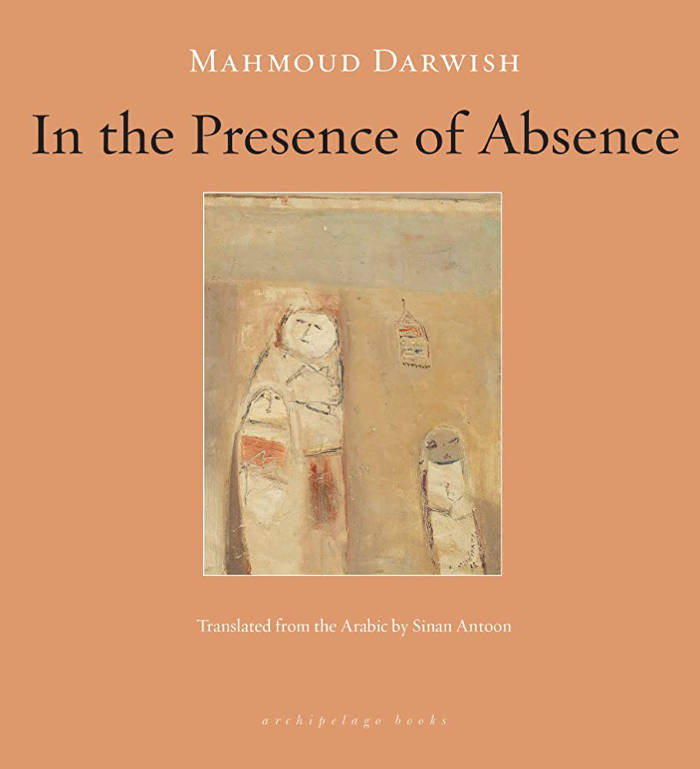
In the Presence of Absence
By one of the most transcendent poets of this generation, a remarkable collection of prose poems that explores themes of love, pain, isolation, and connection. In this self-eulogy written in the final years of Mahmoud Darwish's life, Palestine becomes a metaphor for the injustice and pain of our contemporary moment.
Mahmoud Darwish (1941-2008) was one of the most acclaimed poets in the Arab world. His poetry collections include Why Did You Leave the Horse Alone? and A River Dies of Thirst (Archipelago Books). In 2001 Darwish was awarded the Lannan Cultural Freedom Prize.
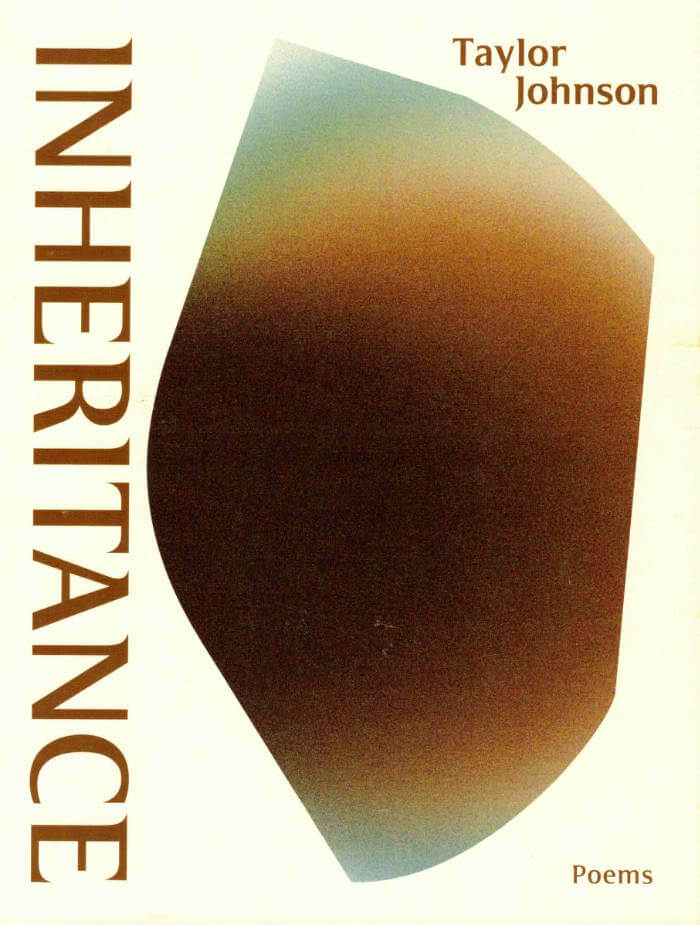
Inheritance
Taylor Johnson’s debut poetry collection, Inheritance, explores the complexities and limitations of language, physicality and capitalism. Resisting singularities, each poem emerges with a distinct sound, space and sensibility. Whether driving in a Lincoln Town Car; moving through pine forests and becoming immersed in the sounds of animals and nature; languishing in a lovers’ invitation, transcending from the syncopation of Go-go or walking the pavements of Washington D.C.—‘dissolving into sound’. Johnson’s critical perspective is rooted in connection. These poems gesture towards the tools we might need for living alongside rather than against or in spite of an inundation of daily oppressions. Be it redefining trans Blackness, environmental degradation, or land ownership and labour. With receptiveness and tenderness Johnson strolls around language, listening to silence—inheriting it, filling it and remaking it.